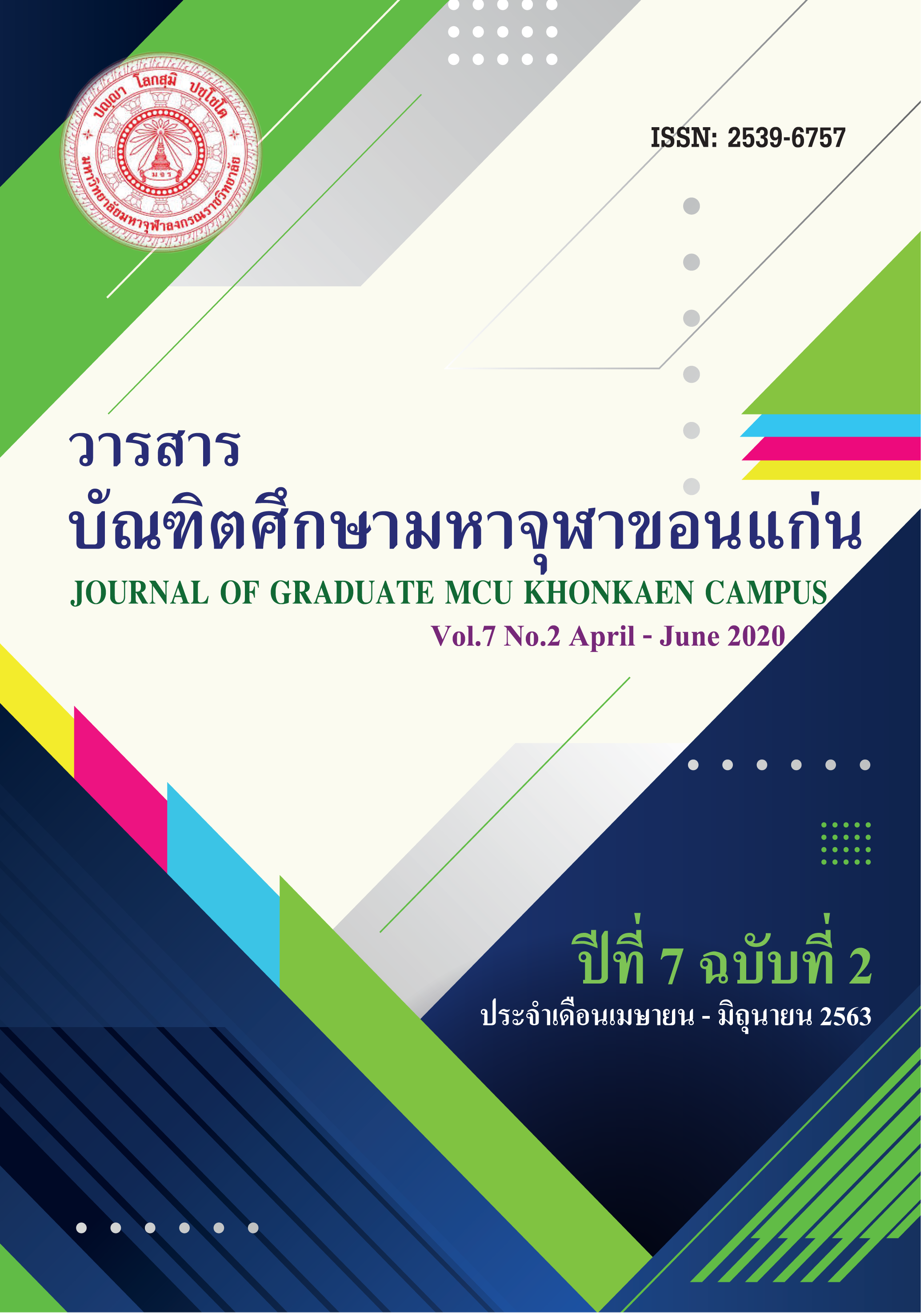THE SEVEN SAPPURISA-DHAMMAS ORIENTED CHARACTERISTICS OF PHRAPARIYATTI-DHAMMA SCHOOL ADMINISTRATORS, GENERAL EDUCATION DEPARTMENT, UNDER THE NATIONAL OFFICE OF BUDDHISM, KALASIN PROVINCE
Main Article Content
Abstract
The Purposes of this research were: 1) to study The characteristics according to the seven sappurisa-dhamma (Qualities of a good man, virtues of a gentleman) of the Phrapariyatti-dhamma school administrators, General education department, under The National Office of Buddhism, Kalasin province; 2) to study the suggestions of the characteristics according to the principle of the Seven Sappurisa-dhamma of the administrators. This study was carried out by means of mixed research methods used to acquire the data from school administrators and teachers at the phrapariyatti-dhamma schools. The Quantitative Research Method was used in collecting data from sample Groups and the Qualitative Research was used to collect the data from key informants (Target Groups). The data were analyzed by using statistical methods and descriptive analysis. The Quantitative Results of the research were summarized and synthesized with the qualitative results by the synthetic analysis.
The research results were as follows:
1) The Characteristic According to the principle of puggalaññutā (Knowing the individual; knowing the different Individuals) was rated at a high level of practice; while, that of Kālaññutā (Knowing the proper time; knowing how to choose and keep time) was in the least.
2) The Suggestions of the characteristics according to the Seven Sappurisa-dhamma of the executives found that 1) The Characteristics according to the dhammaññutā (Knowing the Law) of the Executives (or knowing the duties) rely on the administration with transparency, acceptance of the opinions of every subordinate; 2) Characteristics According to the atthaññutā (Knowing the Meaning; knowing the purpose) of the executive (or knowing the result) are that the supervisor should analyze the weaknesses - strengths to suit the condition of the phrapariyatti schools; 3) the Characteristics According to attaññutā (Knowing Oneself) is that management may be adjusted to exchange Ideas from subordinates in all areas in order to gain knowledge and develop oneself, along with new Ideas; 4) The Characteristics According to mattaññutā (Moderation) of the executives is that the work of the Buddhist School in every aspect must be done gradually because there is a small budget and the schools must work according to the ongoing project plan appropriately; 5) The Characteristics According to the Kālaññutā of the executives (Knowing the time) is to know the value of past time that it is worthwhile and its benefits that are matched with the appropriate timeliness; 6) The Characteristics According to the parisaññatā of the executive's eye (Knowing the Community) relay on the cooperation with the community to organize teaching and learning in accordance with the education, culture and local tradition with good governance; and 7) The Characteristics According to the puggalaññutā (Knowing Individual) refers to the development of educational personnel within the schools to increase their potential increase resulting in high effectiveness of learners. Keywords: Characteristics of administrator, seven sappurisa-dhammas, phrapariyatti-dhamma school.
Article Details
References
พระธรรมปิฎก (ป.อ. ปยุตฺโต). (2546ข). พจนานุกรมพุทธศาสตร์ฉบับประมวลธรรม. มหาวิทยาลัยมหาจุฬาลงกรณราชวิทยาลัย. กรุงเทพมหานคร: โรงพิมพ์การศาสนา.
บุญชม ศรีสะอาด. (2545). การวิจัยเบื้องต้น พิมพ์ครั้งที่ 7. กรุงเทพมหานคร: สุวีริยาสาส์น.
ประกอบ กรรณสูตร. (2542). สถิติเพื่อการวิจัยทางพฤติกรรมศาสตร์. พิมพ์ครั้งที่ 3. กรุงเทพมหานคร: ด่านสุทธาการพิมพ์.
(2014). กลุ่มมนุษย์ศาสตร์ สังคมศาสตร์ และศิลปะ. วารสาร Veridian E-Journal, 7(2), 227-237.
Bass B.M. Bass & Stogdill’s. Handbook of Leadership Theory research and managerial applications (3rd ed.). New York: The Free Press. Mosley. D.C. (1996). Management Concept and Practices. New York: Harper-Collins. (1990).
Bass B.M. and Avolio B.J. Improving Organizational Effectiveness through Transformational Leadership. Thousand Oaks. C.A.: Sage. (1999).
Krejcie & Morgan, บุญชม ศรีสะอาด. (2556). การวิจัยเบื้องต้น. (พิมพิ์ครั้งที่ 9). กรุงเทพมหานคร: โรงพิมพิ์สุวิริยาสาสืน.
Likert. (1932). Technique for the Measurement of Attitudes Archives of Psychology. New York: McHraw Hill International Book Company, 55.

